You are viewing your 1 free article this month. Login to read more articles.
PA: Brexit could help UK sidestep e-book VAT deadlock
The Publishers Association (PA) has expressed its disappointment in Brussels' inability to resolve a dispute with the Czech Republic preventing VAT on e-books from being reduced in the European Union. At the same time, the trade body has suggested one "silver lining" of Brexit could be that the UK takes back control of its VAT rates to make the "overdue" changes.
The PA shared its views while submitting its response to an inquiry by the Treasury Select Committee into VAT in the UK, which is currently looking at what the opportunities and challenges Brexit presents for the UK’s VAT regime and how VAT could be improved.
The European Commission currently classes e-books as "e-publications" which have to be charged a VAT rate. In the UK, e-books are charged a standard VAT rate of 20%, while their print counterparts are exempt from the charge.
In November 2016, the European Commission (‘EC’) proposed allowing countries to drop or eliminate their VAT rates on the electronic books. However, the Czech Republic blocked the reform in June 2017, insisting it be linked to other anti-VAT fraud measures. Over the last few months there has been intensive discussions to resolve the impasse, but at a meeting of finances ministers in Brussels last month the proposal was once again blocked.
PA Chief executive Stephen Lotinga said: "It was disappointing that last week’s ECOFIN meeting in Brussels was yet again unable to break the log jam within the EU on e-book VAT. Against that backdrop, one of the silver linings from Brexit is that UK can take back control of its VAT rates when it leaves the EU – so it is very encouraging that the Treasury Select Committee is consulting on the future of our UK VAT regime.
"One of the biggest injustices of that regime remains the imposition of a 20% tax on e-books, audiobooks and online journals, which discriminates against the print disabled and is both socially and economically counterproductive. The UK government has never taxed printed books – taxing digital books runs counter to its own principles and fails to recognise the changes in the way we all read now, from children looking at digital picturebooks to pensioners who read large-print e-books. Students, the deaf and visually impaired and parents are among those forced to pay more for access. This is unfair and simply doesn’t make sense."
He added: "We have called on the committee to call on government to axe the tax on e-books as soon as it is practical to do so. This will show the world we are serious about being a world-leading digital nation and remove unfair discrimination against digital reading."
As part of its submission to the Select Committee, the PA emphasised its view that "a book is a book" and the tax on e-books equates to a "tax on knowledge", thereby proving ultimately "socially and economically counterproductive".
"A book is a book, however you read it, and recognition of this fact is long overdue," the PA said.
It argued the tax on e-books adversely affects children who are "embracing digital technology more and more", as well as older people over 55 who, according to Nielsen, make up a third of e-book readers and particularly benefit from increased accessibility options and enlarged fonts available in digital formats.
Other groups at a disadvantage are students, universities and academic libraries, the PA said, arguing the tax "significantly impacts ... an already fiscally-strained higher education system", whilst also contradicting stated aims of the Open Access agenda.
At stake is a move that would benefit in the region of 15m e-book readers in the UK, Lotinga said, as well as millions more who use e-journals and e-learning materials and e-zines.
"Successive UK governments have committed to avoiding a tax on learning and education by refusing to apply VAT to print books and journals, as was the case at the outset when VAT replaced the purchase tax in 1973. This is entirely right and the unique status of these products as an educational good has been recognised for 80 years. The general principle of avoiding a tax on knowledge and of making information accessible to all levels of society is even longer established, having taken hold in the 19th century," Lotinga wrote as part of the PA's submission to the inquiry.
"The Publishers Association urges the committee to recommend that this long-standing principle is upheld and brought into the digital age. Such a move would significantly benefit the roughly 15m e-book readers in the UK, as well as the millions more who access ejournals, elearning materials and emagazines/enewspapers that sit behind a pay wall. We will continue to make the case to government that the UK should cut the e-book tax and we very much hope that the committee can consider this measure in its analysis of how the government should structure its VAT regime after the UK withdraws from the European Union."


















